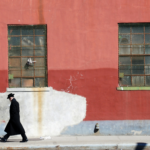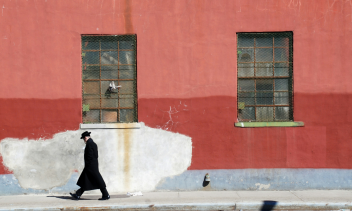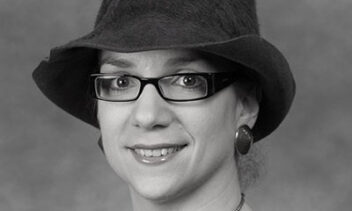I grew up in a relatively sheltered community in Long Island, NY. I don’t have any regrets about being raised there—I very much love the community and friends by whom I was surrounded. To this day, my closest friends are the people I grew up with. But there certainly are drawbacks to such insularity. There was precious little economic diversity within the community I was raised. It was so upper-class that despite my father being a doctor, it always felt like we were one of the more financially strapped families. I know, it sounds crazy thinking about it today. I remember my uncle—a social worker who lives in Vermont (whom I absolutely adore)—once visited. My father introduced him at shul and someone asked him what he does. He said he was a social worker. “You mean you own a social work agency,” the man asked my uncle. No, he was a social worker. The lack of economic diversity in many Jewish communities is a blessing and a curse. Of course, it’s a blessing—so many Jewish families have been able to find incredible success in the American dream. I wouldn’t want to diminish that for a moment. But can we stop pretending that our success hasn’t come at a cost? I think there are three serious costs to our community:
- Obscured Vision of Others: I did not grow up really knowing anyone who struggled financially. If you were to ask my seventh grade self what families I knew who had financial difficulties I likely would have naively replied “my own.” Wealth can obscure our vision of the broader difficulties people within and outside our community have to contend with. I have a close friend, a gem of a human being, who comes from an extraordinarily wealthy family. He’s one of the most generous people I know. He once said that in our increasingly flattened society where geographic boundaries have been rendered nearly moot by the internet, the only lasting significant barrier is wealth. Those who struggle financially often look like they live in a foreign country to those who don’t. It becomes too easy to blame them—if only you tried harder, worked more, then you’d be successful. When our successes are attributed solely to our own efforts, the difficulties of others become their problems and not our problems. One of the most impactful experiences I remember from when I was growing up was when my shul would collect money to support people before Pesach. The person explained that this money was going to people who all live within a one mile radius of the shul. Financial difficulty does not just exist in some distant land. But if you don’t look, you’ll never see it.
- Confusing Jewish Life for Socio-Economic Status: I recently did an AMA on Reddit. It was a lot of fun. Someone asked me about the most concerning trend in the Orthodox community. This was my response: The scariest trend in Orthodoxy is how, especially in the tri-state area, it is becoming increasingly intertwined with socio-economic status and culture. I find that most scary and discuss it a lot in my class at YU. It’s scary because Judaism can’t just be for certain careers or neighborhoods. But the good thing, in a way, of Orthodoxy becoming more cultural is that it makes it both harder and less necessary to leave. I’m worried Orthodox Judaism today is where Conservative Judaism was in the 1950’s. Top of the game, a bit triumphalist, and convinced that it would always be the wave of the future. It’s important for Jewish leaders, parents, and communal members to pay closer attention to why those who leave do. Others have raised the issue about the effects of our lack of economic diversity on our community and I think it is a serious issue that is, unfortunately, only getting worse. Jewish life needs to be more than an economic status.
- Warped Definition of Success: I think the most insidious effect the lack of economic diversity has on our community is in the very definition of success itself. Sadly, for many the word success has become synonymous with financial success. I believe this is nothing short of tragic. If someone is going to lack a sense of esteem and worth for the work they do and what they contribute— absent of wealth—they will find other communities that appreciate them. In many ways, this is not a Jewish problem, it is an American one. And, believe it or not, it is one that began to escalate in the 1840’s. As detailed in Scott Sandage’s fantastic book, Born Losers: A History of Failure in America, the notion of the American Dream also created the reality of feeling like an American failure. Our success can’t just be measured in dollars. We know the price of everything, said Oscar Wilde, and the value of nothing. It’s important that people don’t view themselves as a price tag, but find other ways to measure their value and find satisfaction in their success.
The other major price to the insularity of our community—and increasingly the focus of social action—is racial diversity. I did not grow up with any black friends. In our home, of course, we never allowed racial slurs of any kind, but avoiding overt racism is not enough to qualify you as a Social Justice Warrior. I think the first time I became conscious of the racial component of the Jewish community was at the book launch of Letters to President Clinton (a book I helped edit) by Rabbi Menachem Genack. There were rumors that President Clinton would come to the book launch, so I invited a friend of mine, Jeff Lindor, who I knew was a big admirer of President Clinton. When we arrived, it dawned on me: Jeff was the only black person in the entire room. Now I’m not saying “I don’t see color.” I knew Jeff was black, but I guess I never experienced the sense that you could be the only black person in a Jewish room. I wasn’t sure if Jeff was uncomfortable (he says he wasn’t) and he was very gracious even though President Clinton never arrived. But this was the first time I became viscerally aware that, while many Black Jews exist, overall our community does not have a great deal of racial diversity.
What’s the moral of this story? Honestly, I am still trying to figure it out. Religious communities require some measure of insularity. And there is a blessing in that. The amount of charity, social services and care extended within the Jewish community is simply remarkable. It heartens me as a Jew and makes me so proud to be a part of our community. But insularity also has its challenges. I reject the notion that we should all become global citizens and erase any differences among us. I think there is a way we can have both. It’s not easy since all of these issues—economic diversity, racial diversity, and the very notion of Jewish chosenness—oftentimes merge together in one confusing cholent pot. I recently wrote about this in my reflection on Tractate Eruvin for Tablet Magazine.
Is it better to be a global citizen or a member of tribe? Is it better to have not been created and remain connected to the Source of all humanity or to have been created and live in our fractured and divisive world? Eilu v’eilu divrei elokim chaim—these and these are the words of the living God. To be alive, to be living, to have some modicum of engagement in the ultimate chaim—life itself—is to be engaged in these negotiations. To emulate the living God is less about understanding the nature of existence and more about the nature, pain, alienations, and the sublime struggle of coexistence. To connect and preserve, to unify and divide, to be joined while also remaining separate. And Eruvin shows us how to build this complex notion of self and community. Through the doorways of the eruv, we can see the other and they can see us. And as we peer through the synthetic divisions of the eruv, we are reminded that no matter which side you may find yourself—these and these are the worlds of the living God.
Preserving our differences while also connecting to others are both values that can learn to co-exist. We each have a responsibility to ensure that this world is better than we left it. Judaism is more than floor hockey, fancy bar mitzvahs, and affording a nice home in the tri-state area. But we have to allow it to be more than those things or that is precisely what it will become. The Judaism we create will only be as big as the capacity that our hearts allow. Becoming a bigger, broader, more caring person in turn expands the scope of Jewish life and Jewish ideas.
I’ll leave you with a moving interview with Rabbi Zevulun Charlop, the former dean of Yeshiva University’s rabbinical school. He was asked about Jewish participation in social justice. He responded with a moving idea from his grandfather Rav Yaakov Moshe Charlop, one of the primary students of Rav Kook:
My grandfather wrote, “The future redemption is the redemption of the entire world, all of Israel and all the nations, and all the animals and plants and inanimate objects, and the whole host of the heavens, all the planets, and all the worlds. All will be redeemed to eternal freedom.” We have to believe in this idea and feel it: ge’ulah (redemption) is not for Jews alone. It’s for the whole world.








